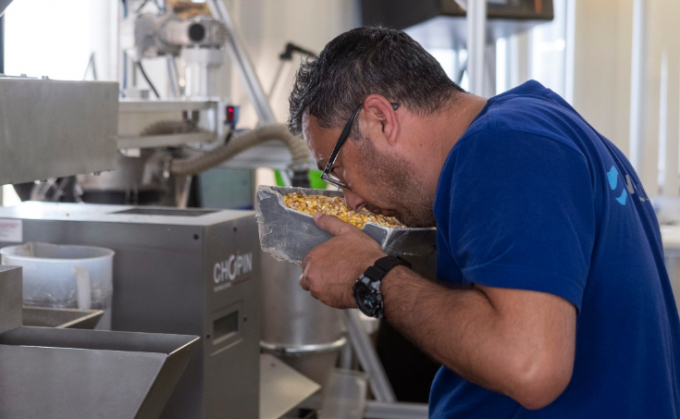November 25, 2025 | 15:53 GMT +7
November 25, 2025 | 15:53 GMT +7
Hotline: 0913.378.918
November 25, 2025 | 15:53 GMT +7
Hotline: 0913.378.918

The calibre of the cereals is assessed by a quality control officer at one of the operators. Photo: Alexandra Radu/Al Jazeera
The Romanian Black Sea port in the city of Constanta has become one of the main transit hubs for Ukrainian grain export, with the war-torn country in a race against time to export about 20 million tonnes of grain stuck in its silos in time to accommodate the harvest of its new crops, which is set to start next month.
“Before the war, there was absolutely no Ukrainian cereal transiting the Constanta port. Now, it amounts to approximately 30 percent of our activity,” said Dan Dolghin, director of the cereal operation at Comvex, one of the main grain operators in the Constanta port.
With a grain storage capacity of 1.5 million tonnes and featuring the fastest cereal handling terminal in the European Union, the port of Constanta became a viable alternative in the context of the maritime blockade of the Ukrainian Black Sea ports, which used to be the main export routes for cereal before the beginning of Russia’s full-scale invasion of Ukraine.
Since the blockade, 616,000 tonnes of Ukrainian grain have reached the Constanta port, with an additional 166,500 tonnes set to arrive in the following weeks, according to the port’s administration.
The relatively slow pace of the Ukrainian grains transiting the Romanian port is set by difficulties in transporting high volumes of cereal from Ukraine to Constanta by land, or by barge via the Danube River from the small Ukrainian ports of Ismail and Reni.
“We initiated the development of a new investment aiming to increase the speed of unloading the barges, the transportation method in which significant quantities of cereal from Ukraine reach us. This investment, which will be operational by the end of June, will increase the unloading capacity of barges to about 28,000 tonnes per day,” said Viorel Panait, director of Comvex.
Slow pace
Romania’s land border crossings with Ukraine and Moldova have been jammed in the recent weeks by queues of trucks longer than 10km (6 miles), waiting for days for customs checks.
There are coordinated efforts being made by the Romanian and Moldovan governments to supplement the number of customs officers and open additional border transit lanes in order to decrease the waiting time at the border.
By train, the main difficulty is the difference in the gauge of the Ukrainian and the EU railways, train wagons needing adjustments before they can cross into Romania, resulting in a slow transit speed, with trains waiting for weeks to cross.
The Romanian transport ministry started the rehabilitation of 4.5km (2.8 miles) of wide gauge railway, which links Ukraine and Moldova to the Romanian port of Galati, the main regional port on the Danube River.
The railway, which has been out of operation for the last 20 years, proves to be essential in decreasing the transit time for cereal and other bulk goods from Ukraine, as its gauge matches the one of the railways in Ukraine and Moldova.
The proximity of Constanta port both by land to Ukraine and by maritime routes to the Suez Canal “make Romania the best candidate to handle these supply routes, which this way become shorter”, said Panait.
“Considering the large grain volumes that are in need of export from Ukraine, I believe this has to be a conjugated effort of all the European operators that have the capacity to participate,” he said. “There is no place for ego here.”
(aljazeera)

(VAN) Brazil's COP30 presidency pushed through a compromise climate deal on Saturday that would boost finance for poor nations coping with global warming but that omitted any mention of the fossil fuels driving it.

(VAN) Poultry farmers in the UK have been warned that they could face one of the worst winters yet for bird flu.

(VAN) Prices of main-crop paddy have risen sharply, with jasmine rice hitting 16,100 baht per tonne — the highest level in years.

(VAN) In Brazil, FAO unveiled a series of reports and initiatives showing how sustainable agrifood systems are a solution to the climate crisis.

(VAN) With names like neodymium and dysprosium, rare-earth elements sound exotic — and their perceived scarcity has only added to the mystique.

(VAN) In a new study published in Trends in Biotechnology, researchers used a gene-editing technology called CRISPR to increase a fungus's production efficiency and cut its production-related environmental impact by as much as 61%- all without adding any foreign DNA.

(VAN) A top official in Beijing’s Cop delegation says China is committed to clean energy – but US’s absence is a problem.